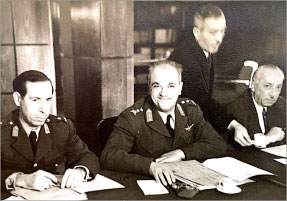


Kayseri holds strategic importance as the city where the Republic of Türkiye launched its first major heavy industry initiative. Following the dissolution of TOMTAŞ, which had operated in partnership with the German aircraft manufacturer Junkers between 1926 and 1928, the facility resumed production in 1931 under the Ministry of National Defense, renamed as the Kayseri Aircraft Factory. The life story of Colonel Fuat Dörtbudak, who worked at this facility for many years and served as its director for a time, provides valuable insights into Türkiye’s engineering education policies during that period.
Born in 1909 to a Turkish officer, Fuat Dörtbudak first encountered military education at Halıcıoğlu Military High School, graduating in 1929. At that time, the Turkish Air Force had not yet been fully organized as it is today and operated under the Ministry of National Defense through the Undersecretariat for Air Force. The Undersecretariat began sending top-performing students from military schools abroad through competitive exams, aiming to prepare them for future roles as aviation officers in various specialized fields. The goal was to establish a domestic aircraft industry, which required the expertise of engineer officers. After passing the exam, Fuat Dörtbudak was awarded a scholarship and sent to the Technische Hochschule Berlin in Germany to pursue an engineering degree.
When he first arrived in Berlin, he began studying aircraft-mechanical engineering and had the opportunity to complete an internship at Junkers Flugzeugwerke. Later, through a second directive received via the embassy, he was instructed to specialize in airframe engineering. This required him to pursue a second university degree, during which he completed an internship at Messerschmitt. It took a total of nine years of training before he was able to return to Türkiye.
When Fuat Dörtbudak returned to Türkiye in 1938, his first post was at the Kayseri Aircraft Factory. It was there that he met and married the niece of the factory’s director, Avni Okar. After the outbreak of World War II, he was sent abroad for a period, and upon completing his assignment, he worked at both the Kayseri and Eskişehir Aircraft Factories. In the following years, he served as Deputy Undersecretary for the Air Force within the General Staff and the Ministry of Defense. During this time, he was offered the directorship of the Kayseri Aircraft Factory once again, prompting his return to Kayseri, where he remained until 1950.
While serving in the General Staff, the British informed him that jet aircraft could be manufactured in Kayseri, and they were ready to collaborate on the project. As a result, he was reassigned from Ankara to Kayseri as the factory director. However, after assuming his role as a director, the project was abandoned due to the arrival of ready-made aircraft from the United States. After completing his mandatory service and with the cancellation of jet aircraft manufacturing in Türkiye, he retired from the military with the rank of colonel. During his service, in 1941, he also published a translated technical book titled “General Information on Aircraft Engines,” which was printed by Kayseri Sümer Press.
After leaving the military in 1950, Fuat Dörtbudak took on his first civilian position at Ereğli Coal Corporation in Zonguldak, where he was involved in establishing both the port operations and coal washing facilities. In the 1960s, under the Turkish Petroleum Corporation (TPAO), he played a key role in developing Türkiye’s NATO western region oil pipelines. Following that project, he oversaw the installation of production facilities for Türkiye Pulp and Paper Factories (SEKA) in Çaycuma and Dalaman. He passed away on August 23, 1972.
Note: This article was written by the author based on an interview with Fuat Dörtbudak’s daughter, Tomru Önalp. A version of it was also published in Aposto newspaper on May 19, 2024